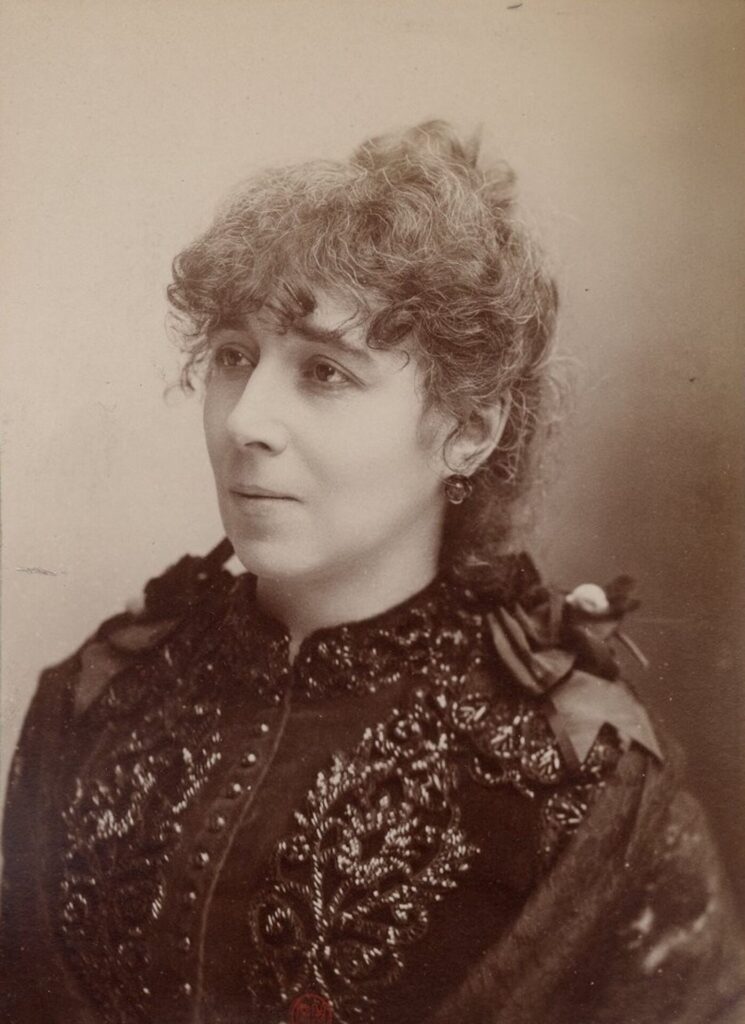Marie Huot: anti-speciesism and feminism, the same fight against domination in the 19th century
At a time when ecological challenges are becoming increasingly urgent, the remarkable journey of Marie Huot (1846–1930) is once again relevant. Long overlooked, her fight for animal rights and women's emancipation has, a century later, become a source of inspiration for younger generations.

Sylvain Wagnon, University of Montpellier
Writer, poet, and libertarian activist Marie Huot was a pioneer in birth control. Her name resurfaced in November 2022, when the world population surpassed eight billion. Population growth is once again a hot political topic.
A battle from yesterday and today
Her ideas resonate strongly with contemporary environmental movements. The current questions being asked by a generation wondering whether to have children, while governments and public opinion remain immobile or paralyzed when it comes to taking action on climate and environmental issues, highlight Marie Huot's potential legacy.
At the same time, her fight against animal cruelty echoes the demands of many environmental and vegan activists. This pioneer of anti-speciesism led a fierce battle against bullfighting, which remains a model for current struggles.
Finally, her commitment paved the way for debates on the convergence of struggles, highlighting the intersectionality of social, feminist, and environmentalist struggles, with the aim of shaping a more united and egalitarian society.
The belly strike
Marie Huot does not advocate simply limiting births. She recommends a more radical human and political course of action: the birth strike.
In 1892, in her article "Maternités" (Motherhood), published in the anarchist newspaperL'En dehors, she directly addressed the issue of abortion and the need for a "strike of the wombs" to combat poverty and inequality between men and women. Her contribution to feminist struggles is emblematic of the desire to make motherhood a conscious, thoughtful act and an element of social transformation.
By making motherhood, or the refusal of motherhood, a subject of political struggle, she also aligns herself with the anti-militarist movement that refuses to consider children as "cannon fodder."
In 2019, the international Birthstrike movement directly carried on Marie Huot's legacy and mode of action, relayed by prominent figures such as Alexandria Ocasio-Cortez.
My body belongs to me!
Above all, Marie Huot believed that women must become fully involved in political struggles in order to emancipate themselves from the exclusive role of wife and mother to which 19th-century bourgeois and capitalist society confined them.
Marie Huot became involved in the "neo-Malthusian" movement , which advocated birth control as a prerequisite for a better life for the working class. She took part in demonstrations, signed petitions, and gave lectures to promote the emergence of birth control, which she considered to be the primary condition for the emancipation of women.
A struggle that is currently being waged by many feminist movements in the name of social justice.
She supported the anarchist educator Paul Robin in his fight for a holistic education that took into account the different facets of the child, contrary to the traditional view of teaching. Learning with the head, but also with the body and emotions, remains revolutionary in the field of education, both yesterday and today.
For Marie Huot, sex education is essential, an unavoidable prerequisite for the advent of a "conscious generation." For women, knowing your body means giving yourself the freedom to do what you want with it. Need we remind you that it took until 2017 for a school textbook to depict a clitoris?
It should also be noted that at the end ofthe 19th century, "procreative prudence" and birth control were violently attacked by conservatives and religious figures who advocated puritanical and strict morality. And within revolutionary and progressive circles, these were minority issues.
Animal rights and feminism
Alongside the first French libertarian feminists, who were "neither housewives nor courtesans," Marie Huot committed herself to fighting against the patriarchal system of domination. For her, the convergence of feminist and animal rights struggles was obvious, as the patriarchal and capitalist system oppresses and dominates both women and animals.
In her writings on animal rights, she constantly highlights the similarities between violence inflicted on animals and violence suffered by women. Through concrete action, she fights against experimental medicine practiced by male doctors who take advantage of their position of power to conduct violent and unnecessary experiments on animals, but also on women.
She protested against doctors who, in the name of Claude Bernard's so-called experimental method, abused vivisection "in demonstrations repeated a thousand times." She did not hesitate to interrupt Dr. Brown-Séquard, who was performing a public vivisection on a young live monkey. Her friendship with Louise Michel, an anarchist activist and major figure in the Paris Commune, revealed in their correspondence, shows Marie Huot to be combative, carrying out numerous "hard-hitting" actions and interventions within the Popular League Against Vivisection, particularly against bullfighting, which was beginning to develop in France.
During her lifetime, Marie Huot was attacked as a woman, a libertarian, and an anti-speciesist. She was ignored by historians because of her eclecticism and the difficulty of "pigeonholing" her into a specific ideological current. Yet Marie Huot laid the foundations for an anti-speciesist philosophy. She forcefully asserted that sexism and speciesism share the same roots of discrimination and domination, and that they must be fought together to achieve a new balance between all living beings, based not on domination but on equality.
Sylvain Wagnon, Professor of Education Sciences, Faculty of Education, University of Montpellier
This article is republished from The Conversation under a Creative Commons license. Readthe original article.